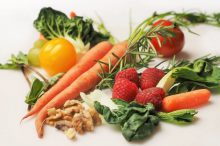Contents
Growth Vitamins For Your Hair Health

There are so many ways that we can ensure and encourage our overall hair health which automatically leads to hair growth…something we all want to have, whether we are a man or a woman. The funny thing is this – we usually know what’s best for us, however, we are slow to implement or do what is needed.
Ensuring that your vitamin and mineral intake is where it should be, is paramount to your health in more ways than one. And the results will show all over, not just in your hair health, but your skin, nails, metabolism, your general health. Of course, the more natural way you can make this happen, the better! Let’s look at 5 essential hair growth vitamins and see where you stack up.
1.Iron
Iron is a mineral which is needed for our bodies to perform in a healthy way. Iron is found in our blood and is usually referred to as hemoglobin. This is a protein which is used to distribute oxygen to the tissues in our bodies. There are two types of iron in our diets: heme and nonheme iron. Heme iron is derived from the breakdown of hemoglobin and is only found in animal products. Plant-based iron is referred to as nonheme iron.
Sources of iron include:
- Liver
- Red meat
- Chicken
- Seafood
- Pork
- Soybeans
- Legumes
- Tofu
- Spinach
- Strawberries
- Raisins
- Fortified Foods (cereals)
Iron deficiency, as well as iron toxicity, can be a problem for our bodies. You have to ensure that you are getting the right amounts based on your age, weight, and necessity. Iron deficiency is caused when you are not getting enough or absorbing enough iron or if there is excessive blood loss. This can cause anemia.
The more common symptoms are fatigue, a swollen tongue, impaired social development in children, and suppressed immune system. It is found most often in menstruating females, pregnant women, and older toddlers. Vitamin C enhances the absorption of iron, and it is recommended that foods high in vitamin C should be included in the diet.
2. Magnesium
Another mineral that your body needs is magnesium. It helps your body to absorb and use other minerals like calcium. They work hand in hand together for the efficient functioning of your body. As you already know, calcium is needed to help your bones be strong. Without magnesium, this can lead to clogged arteries and calcifications in your joints and organs. There can also be calcium deposits on your scalp, which in turn will cause dryness, flaking, and even hair loss. You can even spray liquid magnesium directly on your scalp.
Sources of magnesium are listed below. However, the most common source is the dark, green leafy vegetable which is high in chlorophyll.
A few common sources:
- Spinach — 1 cup
- Chard — 1 cup
- Pumpkin seeds — 1/8 cup
- Yogurt or Kefir — 1 cup
- Almonds — 1 ounce
- Black Beans — ½ cup
- Avocado — 1 medium
- Figs — ½ cup
- Dark Chocolate — 1 square
- Banana — 1 medium
Possible causes due to insufficient magnesium in our bodies are:
- Hormone imbalance and PMS
- Fibromyalgia
- Heart attack
- Type 2 diabetes
- Osteoporosis
- Constipation
- Tension or migraine headaches
- Anxiety and depression
- Chronic fatigue
Like everything in life, remember everything in moderation. Watch your intake and by all means, be consistent and your body will thank you for it.
3. Niacin
Niacin is a member of the B vitamin family. It is also known as B3 or nicotinic acid. It plays a big role in healthy hair growth. It is water-soluble and helps the body convert food into energy. It helps to nourish the scalp and promote healthy hair.
The main function of niacin is to transform carbohydrates into energy. It also helps to maintain the structure of the blood cells and improves blood circulation. By bringing more blood flow to the scalp, the hair follicles will get more oxygen and nutrients.
Sources of niacin:
- eggs
- tuna
- beef
- nuts
- mushrooms
Possible symptoms from a lack of niacin: general body fatigue, brittle and thinning hair, hair loss, and a health condition called pellagra.
4. Biotin 
Biotin is a member of the B vitamin family. It is a fact that this vitamin is a great advocate for longer, healthier hair. It is found in pill or powder form as a hair supplement. You can get biotin from the foods you eat, however, because it is a water-soluble vitamin, the body does not retain it, so it needs a daily supply.
It helps your hair by rebuilding hair shingles that have been damaged from over-shampooing, environmental exposure, harsh heat use on your hair, such as blow-drying and ironing. Vitamin B5 supports the adrenal glands, which helps stimulate hair growth. You can also use biotin enhanced shampoos, conditioners produced mainly for external hair care.
Sources of biotin:
- eggs
- beef
- chicken
- avocado
- legumes
- nuts
- potatoes
Possible evidence of a biotin deficiency can include hair loss and hair thinning.
5. Zinc
Zinc is a very little featured mineral, however, it is still necessary for a great head of hair. It helps in making your hair shine! Zinc is an essential co-factor for multiple enzymes and in the functioning of activities in the hair follicle. Zinc is also a potent inhibitor of hair follicle regression, and it accelerates hair follicle recovery. It helps to build hair protein.
Zinc has been used in biological case studies for the four types of hair loss, including alopecia areata, male pattern hair loss, female pattern hair loss and telogen effluvium. It was seen that zinc helped in all instances. The research ended with a recommendation for an oral intake of zinc supplements.
Sources for zinc:
- legumes
- mushrooms
- non-fat dry milk
- spinach
- whole grains
- pumpkin seeds
- sunflower seeds
Possible causes due to zinc deficiency are hair loss, hair thinning, and lack-luster hair.
My final thoughts
The most important thing that you can do for your health, which will include your hair, skin, and nail health, is to pay attention to the intake of the aforementioned vitamins and minerals. Try to get as much as you can from natural products and where you need to, use supplements. I wish you a happy, healthy lifestyle.
